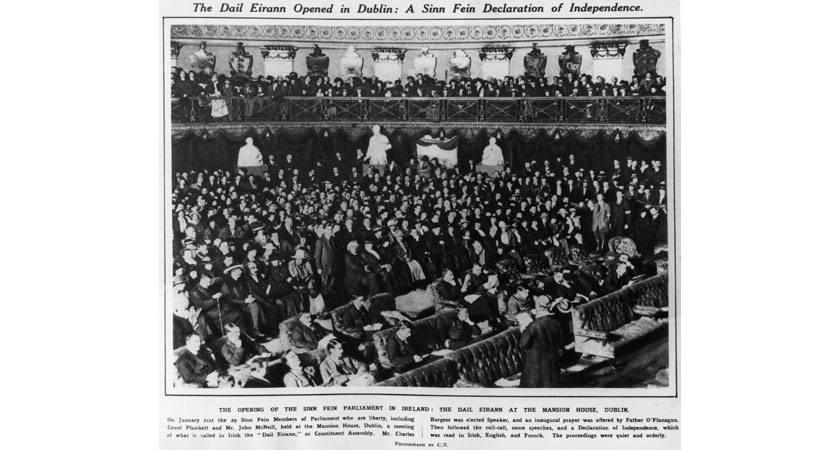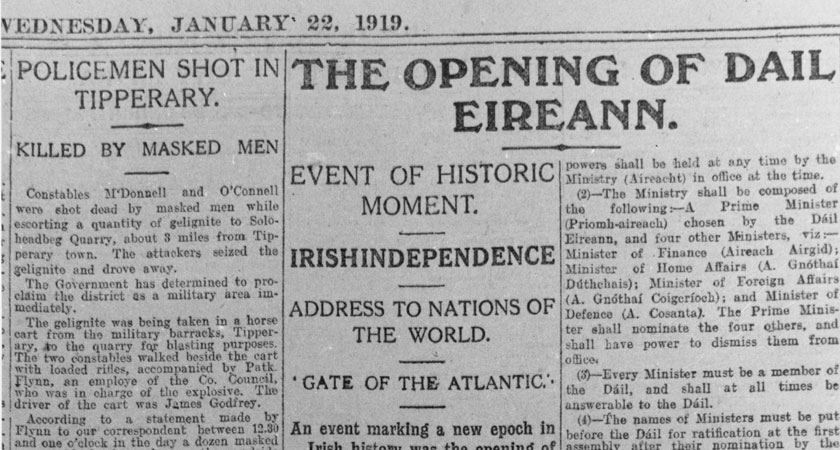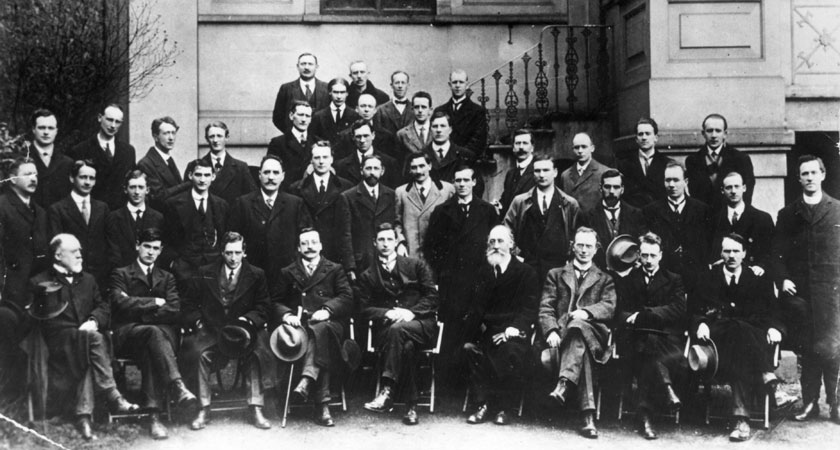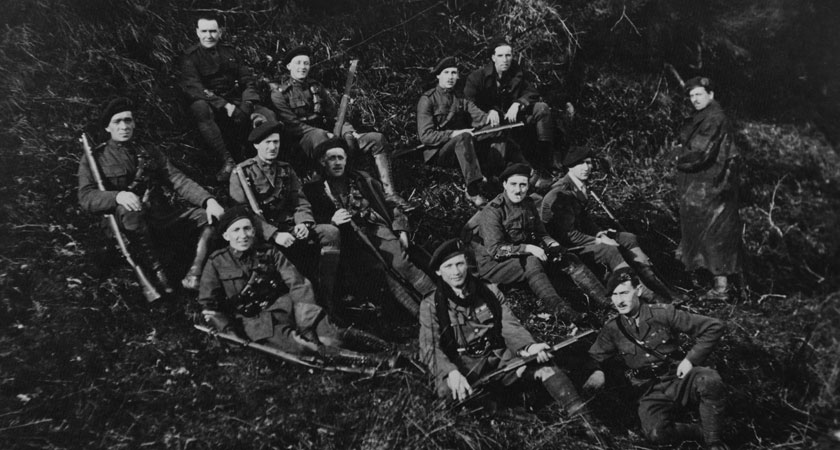JANUARY 21 marks the anniversary of the first meeting of Dáil Éireann in 1919.
A month earlier Sinn Féin had won a landslide in the Irish General Election, but refused to take their seats at Westminster.
Instead, they formed a Parliament in Dublin, Dáil Éireann.
Some commentators at the time were sceptical, with one newspaper dubbing the event 'futile and unreal', but it proved to be a major step en route to Ireland’s independence from Britain.
Here are 12 facts about the first meeting of Dáil Éireann:
1. Only Sinn Féin members attended
Of the 105 seats up for grabs in the December 1918 Irish General Election, Sinn Féin won 73.
With its aim of establishing an independent republic, its popularity had increased in part due to people’s anger at the execution of the leaders of the 1916 Easter Rising.
The other MPs who won seats, from the nationalist Irish Parliamentary Party and the Irish Unionist Party, refused to attend the January 21 meeting.
2. Most couldn’t make it
Despite winning 73 seats, only 27 Sinn Féin MPs turned up to the Round Room at the Mansion House, the residence of the Lord Mayor of Dublin.
Thirty-four were listed as ‘faoi ghlas ag Gallaibh’ (imprisoned by the foreigners) and three as ‘ar díbirt ag Gallaibh’ (deported by the foreigners).
In fact, the members in attendance were vastly outnumbered by onlookers and journalists.
 A newspaper report on the inaugural meeting of the First Dáil (Image: Hulton Archive / Illustrated London News / Getty)
A newspaper report on the inaugural meeting of the First Dáil (Image: Hulton Archive / Illustrated London News / Getty)3. Unusual entrance music
The new Dáil wasn’t the only gathering at the Mansion House that day.
It had earlier hosted a celebration for former prisoners of war from the Dublin Fusiliers, recently returned from France.
The Manchester Guardian reports: “As they walked out to the tune of God Save the King, the republicans walked in.”
4. Start with a prayer
Those in attendance probably never envisioned that almost a century later, the Dáil would be voting on whether to abolish the prayer at the start of daily Dáil proceedings.
The tradition of opening with a prayer started with Fr Michael O’Flanagan, who read the prayer at the first meeting.
Unlike today, it was said only in Irish.
In fact the entire proceedings were in Irish, except for the French and English readings of the Declaration of Independence, the Message to the Free Nations of the World and the Democratic Programme.
5. Sign me in
While there were only 27 members in attendance, 29 names were originally registered as present.
The attendance of Michael Collins and Harry Boland was apparently incorrectly called.
This was reputedly to conceal their mission to spring Eamon De Valera from Lincoln Gaol, which happened on February 3.
However attendee Máire Comerford said the pair were there – they just skipped out early.
 A newspaper report on the previous day's meeting and the Soloheadbeg Ambush (Image: Hulton Archive / Getty)
A newspaper report on the previous day's meeting and the Soloheadbeg Ambush (Image: Hulton Archive / Getty)6. Declaration of Independence
During the two-hour sitting, Dáil members issued a Declaration of Independence.
This ratified the Irish Republic proclaimed by Pádraig Pearse on Easter Monday 1916 on the steps of the GPO.
It ordained that “the elected Representatives of the Irish people alone have power to make laws binding on the people of Ireland, and that the Irish Parliament is the only Parliament to which that people will give its allegiance”.
7. Recognition request
Members also asked countries to recognise Ireland as a separate nation, free from British rule.
It said the "existing state of war" between Ireland and England would continue until Ireland achieved independence.
The Message to the Free Nations of the World read: “The Nation of Ireland having proclaimed her national independence, calls, through her elected representatives in Parliament assembled in the Irish Capital on January 21, 1919, upon every free nation to support the Irish Republic by recognising Ireland's national status and her right to its vindication at the Peace Congress.”
It added: “Ireland is one of the most ancient nations in Europe, and she has preserved her national integrity, vigorous and intact, through seven centuries of foreign oppression.”
8. Socialist principles
The third major document issued on the day was the Democratic Programme.
It declared the country be ruled on the principles of liberty, equality and justice for all, and that the country’s resources, wealth and means of production belonged to the people of Ireland.
“In return for willing service, we, in the name of the Republic, declare the right of every citizen to an adequate share of the produce of the Nation’s labour,” it read.
According to the programme, it was the Republic’s duty to safeguard the physical, mental and moral wellbeing of its people, and ensure no child went without food, clothing, shelter and education.
 A later meeting of the First Dáil in April 1919, with recently elected Dáil President Eamon De Valera (Image: General Photographic Agency / Getty)
A later meeting of the First Dáil in April 1919, with recently elected Dáil President Eamon De Valera (Image: General Photographic Agency / Getty)9. Provisional President
Members adopted a provisional Constitution that established a cabinet, comprising the President of Dáil Éireann (Príomh Aire) and four other ministerial positions, while Cathal Brugha was elected Ceann Comhairle.
He held the post until the following day when he was elected President, but only on a provisional basis until De Valera could be elected to replace him, once he had escaped prison.
De Valera was duly elected at the Dáil’s third meeting on April 1.
Brugha’s Dáil presidency lasted a total of 69 days, still significantly longer than his stint as speaker.
10. Events elsewhere
The Irish War of Independence began on the same day.
While Brugha was overseeing affairs in Dublin, members of the Irish Volunteers, acting on their own volition, carried out an attack in Tipperary.
The Soloheadbeg Ambush saw two Royal Irish Constabulary officers shot dead and the Irish Volunteers seize a huge consignment of explosives.
Although not acting on behalf of the Dáil, the Irish Volunteers expressed its support for the parliament later that month.
In August 1920, members of the organisation – by this time more commonly known as the Irish Republican Army – took an official oath of allegiance to the Irish Republic and the Dáil.
 Members of the Royal Irish Constabulary resting in the hills of Tipperary in 1921 during the Irish War of Independence (Image: Hulton Archive / Getty Images)
Members of the Royal Irish Constabulary resting in the hills of Tipperary in 1921 during the Irish War of Independence (Image: Hulton Archive / Getty Images)11. What the papers said
On January 22, The Irish Times called the Dáil meeting “futile and unreal”.
It described it as “an act of defiance by a body of young men who have not the slightest notion of that Empire’s power and resources and not a particle of experience in the conduct of public affairs.”
It added: “The more quickly Ireland becomes convinced of the folly which elected them the sooner her sanity will return.”
The Daily Mail reported: “On the whole it was a very interesting and notable function but one can hardly say it was impressive.”
The Times said: “History will probably date the definite decline of the Sinn Féin movement from the day when the national Assembly was opened in Dublin.”
However the Daily News was much less flippant, warning: “It is very easy to laugh at the Sinn Féin Parliament, but it is not so certain that it is wise… behind the Declaration of Independence at Dublin yesterday fiercely in earnest is the solid mass of almost all Irish opinion outside Ulster.”
12. Independence day
The Anglo Irish Treaty in 1921 brought an end to the War of Independence and led to the establishment of the Irish Free State in 1922.
The country’s final ties to Britain were severed when the Republic of Ireland Act came into force in 1949.
However so important were the events of January 21, 1919, it is being considered as the date Ireland should celebrate its independence.
A Private Members Bill tabled by Fianna Fáil senator Keith Swanick in 2017 has passed the second stage in the Seanad.
Believing such an important occasion should be marked, he said: “The 1918 General Election and meeting of the First Dáil on January 21, 1919 transformed this island and changed the course of our history.”
Swanick hopes the legislation will be passed into law before the centenary next year.

